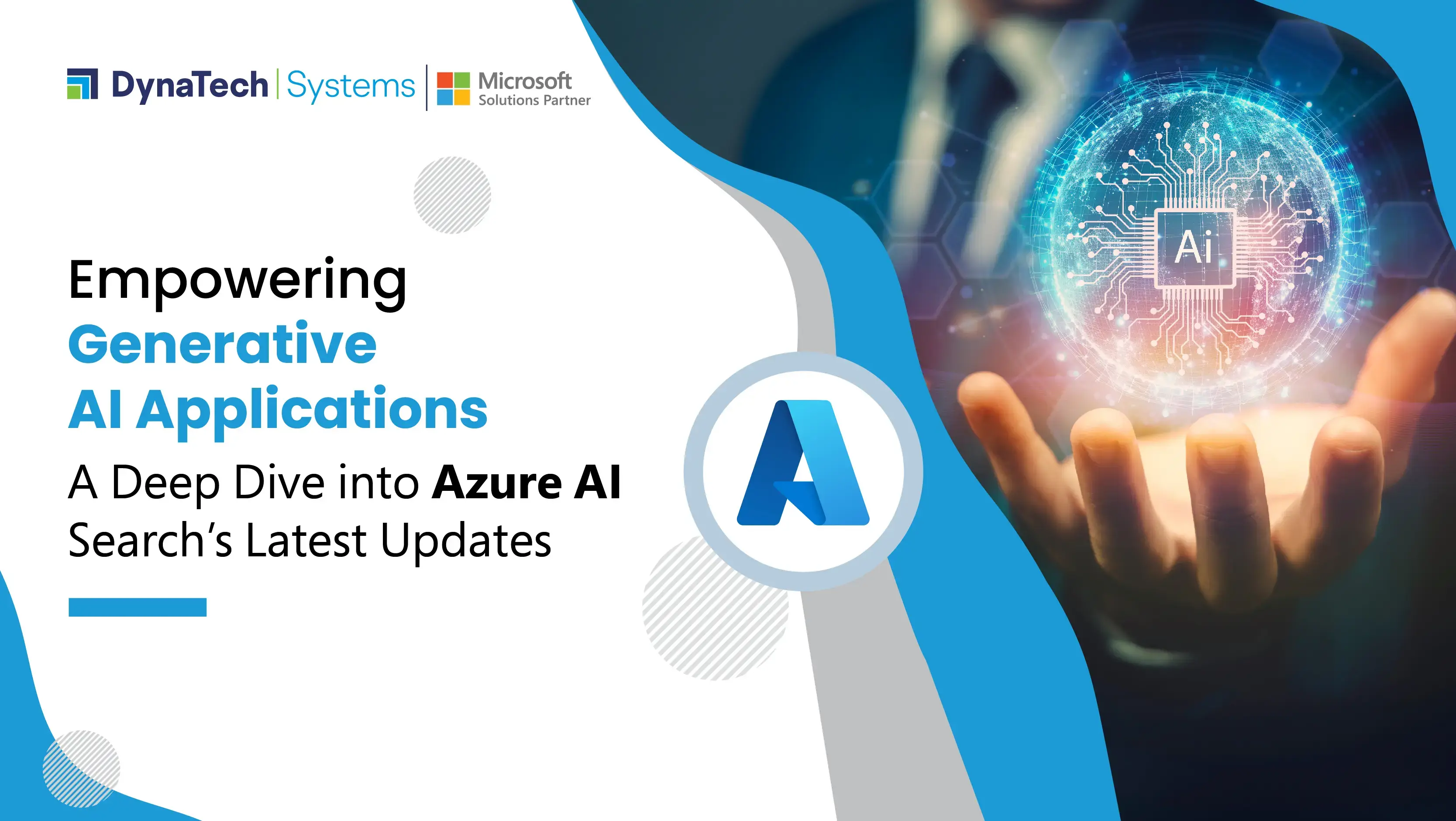The field of Generative AI (GenAI) is rapidly evolving, and Azure AI Search is at the forefront of this revolution. By providing a robust and scalable cloud search platform, Azure AI Search empowers organizations to build and deploy cutting-edge GenAI applications. Recent updates to Azure AI Search significantly enhance its capabilities for Retrieval-Augmented Generation (RAG), a powerful GenAI technique.
This blog post showcases these exciting advancements, exploring how they unlock new possibilities for developers and businesses alike.
Introducing Retrieval-Augmented Generation (RAG)
Retrieval Augmented Generation (RAG) represents a paradigm shift in how search engines process and deliver information. By integrating retrieval-based and generation-based approaches, RAG enhances the quality and relevance of search results.
RAG is a transformative GenAI approach that combines the strengths of information retrieval and Large Language Models (LLMs). In short, RAG leverages Azure AI Search to retrieve relevant information that informs and guides the LLM’s generation process. This leads to more accurate, informative, and factually grounded outputs.
Supporting Large RAG-Based Applications
Azure AI Search is now fully equipped to support large-scale RAG-based applications, making it a trusted choice for enterprises managing mission-critical search and generative AI workloads.
Over half of the Fortune 500 companies, including industry giants like OpenAI, Otto Group, KPMG, and PETRONAS, rely on Azure AI Search for their enterprise search needs.
When OpenAI launched its RAG-powered “GPTs” and the Assistant API, it needed a robust and scalable retrieval system capable of handling unprecedented demand and scale. It turned to Azure AI Search for its proven capacity to support large, internet-scale RAG workloads.
ChatGPT alone receives 100 million weekly visitors, with over 2 million developers building with API. Within just 2 months of announcing custom GPTs, 3 million GPTs were created, demonstrating the immense scale and trust placed in Azure AI Search.
Enhanced Integration with Azure Machine Learning
Azure AI Search now boasts seamless integration with Azure Machine Learning, rendering powerful tools for creating and deploying machine learning models. This integration empowers organizations to train custom models tailored to their specific search needs. By integrating AML, Azure AI Search allows for the continuous improvement of search algorithms based on real-time data and user interactions, ensuring that search capabilities evolve and adapt to changing requirements,
RAG-powered GPTs
The incorporation of RAG-powered GPTs into Azure AI Search is a game changer. GPTs are renowned for their ability to create human-like text based on input data. When combined with RAG, GPTs leverage the retrieved information to generate coherent and contextually rich responses.
This capability is particularly beneficial in complex query scenarios where simple keyword matching fails to deliver satisfactory results.
Azure AI Search Updates: Supercharging RAG Applications
1. Unmatched Scalability and Cost Efficiency
- 11x Increase in Vector Index Size: This increase allows users to handle much larger datasets, facilitating the development of more complex and sophisticated generative AI capabilities.
- 6x Increase in Total Storage: Enhanced storage capacity ensures that users can store more data, providing a richer and more comprehensive search experience.
- 2x Improvement in Indexing and Query: Faster indexing and querying translate to more efficient search processes, enhancing the overall user experience.
2. Binary Vector Support
- Larger Vector Datasets at Lower Costs: By leveraging binary vectors, developers can store considerably larger vector datasets without incurring substantial storage costs. This opens doors for building and deploying large-scale RAG applications more efficiently.
- Maintaining or Improving Search Speed: The adoption of binary vectors doesn’t compromise on search performance. As per a report, binary embeddings can retain up to 95% of the search quality while reducing the storage space required for vector data by a staggering 32x. This results in maintaining or even improving search speeds while handling larger datasets.
3. Enhanced Relevance with Score Threshold Filtering
- Filtering for High-Similarity Documents: The “threshold” property allows developers to filter out documents with low similarity scores before the results from various recall sets are combined. This ensures that only the most relevant documents, based on vector or hybrid similarity, are presented in the final search results.
- Flexibility in Prioritization: Developers have the option to prioritize filtering based on either “searchScore” or “vectorSimilarity”. This flexibility allows them to tailor the search experience to their specific needs, ensuring that documents with the highest keyword relevance or the closest vector similarity are presented first.
4. Granular Control with Vector Weighting
- Favor Vector Similarity: Developers can prioritize vector similarity over keyword similarity by assigning a higher weight to the vector query. This ensures that documents with a closer semantic match based on the vector data are ranked higher in the search results.
- Multi-Vector Prioritization: In cases involving multiple vector queries, developers can define relative weights for each vector, allowing them to favor the similarity of one vector field over another. This fine-tuning ensures that the final search results prioritize documents that best match the specific vector fields deemed most crucial for the search intent.
5. Tailored Hybrid Search with MaxSizeRecall
- Improved Relevance: By limiting the number of text documents retrieved, developers can focus on the most relevant documents based on vector similarity. This can significantly improve the overall relevance of the search results.
- Controlling Retrieved Documents: The “count” property allows developers to either include all matching documents or restrict the results to a defined window. This flexibility provides granular control over the number of documents returned, optimizing performance and user experience.
- Performance Optimization: Reducing the number of text documents retrieved in hybrid searches can lead to a significant improvement in query latency. This results in a faster and more responsive search experience for end-users.
6. Targeted Boosting for Enhanced Results
- Prioritizing Freshness: Developers can boost documents based on their creation date, ensuring that the most recent and up-to-date information appears at the top of the search results.
- Geolocation Relevance: For location-based searches, developers can boost documents based on user geolocation, ensuring that geographically relevant results are prioritized.
- Keyword Specificity: Developers can assign a boost to documents that contain specific keywords that are crucial for the search intent. This enables them to fine-tune the search results and ensure that documents containing the most relevant keywords rank higher.
Conclusion
The recent updates to Azure AI Search reflect upgradation in search technology, rendering unparalleled scalability, performance, and cost efficiency. Businesses can build and deploy advanced generative AI apps by increasing vector index sizes, storage capacity, and integration with Azure Machine Learning. The ability to support large RAG-based applications further strengthens Azure AI Search as a trusted and powerful tool for enterprises worldwide.
As the digital landscape continues to evolve, winning the market with cutting-edge tools like Azure AI Search is essential for businesses to unlock the full potential of their data, drive innovation, and deliver superior user experiences.
Ready to unlock the potential of Retrieval-Augmented Generation (RAG) for your business? Contact DynaTech Systems today and learn how Azure AI Search can empower you to build and deploy advanced generative AI applications.




























